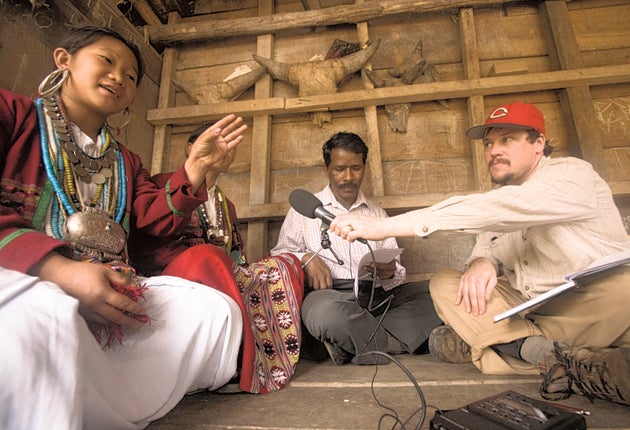Explorers in India find something almost unheard of: a new language

Researchers who had used bamboo rafts to ford surging rivers and climbed steep mountains in the remote north-east of India were rewarded for their toil with the discovery of a rich new language spoken by fewer than 1,000 people.
The linguists had travelled to Arunachal Pradesh, a state that requires a special permit to visit, in order to investigate two little-known tongues. But while speaking with members of a hill tribe they discovered a third "hidden" language.
Initially they thought it was a dialect of one of the others before concluding it was sufficiently different to be considered distinct. Few of the tribe members who speak the language are under the age of 20.
"We were finding something that was making its exit, was on its way out," Gregory Anderson of the Living Tongues Institute in Oregon, one of three linguists who made the discovery, told reporters this week. "And if we had waited 10 years to make the trip, we might not have come close to the number of speakers we found."
The language they discovered amid the barley-growing and pig-keeping tribes is Koro and belongs to the Tibetan and Burmese family of languages. The tribespeople speak two known languages, Aka and Miji, but when the researchers sat down to record the people talking they discovered different sounds that made them convinced they were hearing something new. For instance, while the Aka word for a pig is "vo", Koro speakers call it "lele". Koro also has a distinct grammar. The researchers believe it may have had its roots as a slave tongue.
Writing of their discovery in a new book, The Last Speakers, which documents their find, David Harrison, a linguist at Strathmore College in Pennsylvania, said: "Koro could hardly sound more different from Aka. They sound as different as, say, English and Japanese."
The people interviewed by the team, which also included the Indian linguist Ganesh Murmu, were members of the Aka culture and their community is close to the borders of China, Tibet and Burma. Subsistence farmers who also hunt and gather firewood from dense jungles, the Aka people are also known for their ornate red garments made from hand-woven cloth. While their languages and culture are not well known, some have been recorded since the 19th century.
Their location in the West Kameng and East Kameng districts, where a myriad of tribes and cultures exist, is considered one of the world's richest linguistic hot-spots. It has also remained largely protected, partly as a result of its remoteness and also because the Indian government's sensitivity over its proximity to China means outsiders requires a special permit to visit.
The researchers' discovery of Koro in 2008 brings the number of documented languages in the world to 6,910. While previously unnoticed tongues are found "from time to time" and are not considered rare, linguists estimate that a language dies every two weeks with the death of its last speakers.
Experts say such losses can have a huge impact. Speaking of Koro and its speakers, Dr Harrison told National Geographic, which partly funded the research trip: "It contains very sophisticated knowledge that these people possess about this valley, the eco-system, the animals, the plants, how they have survived here, how they have adapted. If they switch to another language, that knowledge will simply be lost."
One of the many fascinating aspects of the language's discovery is that the Aka and Koro speakers interviewed by the researchers did not consider themselves different and did not believe Koro represented anything than a minor variation. In reality, said the researchers, Koro is a "distant sister of Aka". In most cases where there is a minor language, it suffers as a result of its more regularly spoken neighbouring tongue.
"It is quite possible that two living communities can coexist and still maintain their separate languages," said K V Subbarao, a professor at the Centre for Applied Linguistics and Translation at the University of Hyderabad. "Certainly, it is uncommon for them to deny a distinction – the smaller group usually insists they are different."
Endangered languages
* The UN atlas of endangered languages lists some 230 languages that have become extinct since 1950.
* It is generally accepted that there are some 3,000 endangered languages worldwide.
* There are some 200 languages that are critically endangered with fewer than 10 speakers. In Europe, Karaim in western Ukraine has just six speakers.
* The UN says that a language generally disappears with the death of its last speaker or when they shift to speaking another language, for example one that is used by a more powerful group.
* Extinct languages in the past 40 years have included Manx, on the Isle of Man, in 1974.
* The native language of the Alaskan Eyak Indian tribe in 2008 became extinct with the death of Marie Smith Jones. After the deaths of her siblings – mostly from smallpox and influenza – and when it became clear that people who could speak the language were dying out, she helped compile a dictionary for the use of future generations. She married and had nine children but they grew up learning English.
Join our commenting forum
Join thought-provoking conversations, follow other Independent readers and see their replies
0Comments